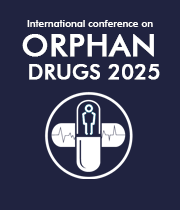Title : Recent advances in orphan drug development: From research to clinical application
Abstract:
The development of orphan drugs, which are designed to treat rare diseases affecting a small percentage of the population, has seen significant advancements in recent years. This presentation aims to explore the multifaceted progress in orphan drug development, encompassing the journey from initial research to clinical application.
Firstly, the presentation will highlight the latest scientific breakthroughs in understanding the genetic and molecular bases of rare diseases. Advances in genomics, proteomics, and bioinformatics have paved the way for identifying novel therapeutic targets and biomarkers, thereby accelerating the discovery of potential orphan drugs. Case studies of recent successes in drug discovery for rare diseases will be discussed, showcasing how cutting-edge research is translated into tangible therapeutic options.
Secondly, the presentation will address the critical challenges faced in the development of orphan drugs. These include the limited patient population for clinical trials, high costs of research and development, and regulatory hurdles. Innovative strategies to overcome these challenges, such as adaptive clinical trial designs, patient registry utilization, and collaborative research initiatives, will be examined. The role of global regulatory frameworks, including the FDA’s Orphan Drug Act and the European Medicines Agency’s orphan designation, in facilitating drug development will also be analyzed.
Moreover, the presentation will delve into the importance of patient-centric approaches in orphan drug development. Engaging patients and patient advocacy groups in the research process not only helps in understanding the disease impact but also in designing more effective and acceptable therapeutic interventions. Examples of successful collaborations between researchers, pharmaceutical companies, and patient organizations will be highlighted, demonstrating the benefits of a collaborative approach.
In addition, the application of advanced technologies such as CRISPR gene editing, stem cell therapy, and personalized medicine in developing treatments for rare diseases will be explored. These technologies offer promising avenues for creating targeted and effective therapies, potentially transforming the treatment landscape for many rare conditions.
Lastly, the presentation will discuss the transition of orphan drugs from research to clinical application. This includes navigating the regulatory approval process, post-marketing surveillance, and ensuring patient access to approved therapies. Strategies for effective commercialization and distribution of orphan drugs will be covered, emphasizing the importance of sustainable and equitable access to treatments for all patients.
In conclusion, this presentation will provide a comprehensive overview of the recent advances in orphan drug development, highlighting the scientific, regulatory, and patient-centric aspects that drive progress in this field. By showcasing the journey from research to clinical application, the discussion aims to inspire continued innovation and collaboration in the fight against rare diseases.


